Cloud migration is more than a 'lift-and-shift'; it's a critical technical evolution requiring specialized expertise in architecture, automation, and security. A misstep can lead to spiraling costs, security vulnerabilities, and operational chaos. This guide moves beyond marketing claims to provide a technical, actionable breakdown of the leading cloud migration service providers. We will dissect their core methodologies, technical capabilities, pricing structures, and ideal customer profiles.
Our goal is to equip you, whether you're a startup CTO or an enterprise IT leader, with the detailed insights needed to select a partner who can not only move your workloads but also modernize your infrastructure for resilience and scalability. When vetting technical partners, examining case studies that highlight their ability to manage complex, high-stakes projects is crucial. A compelling example is Salesforce's zero-downtime Kafka migration, which showcases the level of engineering precision required for such tasks.
This listicle provides a comprehensive comparison to help you find the best fit for your specific technical and business objectives. We'll explore everything from DevOps-centric talent platforms to enterprise-scale global integrators and hyperscaler marketplaces. Each entry includes direct links to the providers and in-depth analysis of their services, covering core offerings, pros, cons, and who they are best suited for. This allows you to bypass generic marketing and focus directly on the technical merits and practical value each provider offers, empowering you to make a well-informed decision.
1. OpsMoon
OpsMoon operates on a powerful and distinct premise: pairing organizations with elite, pre-vetted DevOps talent to execute complex cloud projects with precision and speed. Positioned as a specialized DevOps services platform, it excels as one of the top-tier cloud migration service providers by transforming the often chaotic process of finding, vetting, and managing expert engineers into a streamlined, results-driven engagement. This model is particularly effective for startups, SMBs, and enterprise teams that need to augment their existing capabilities without the overhead of traditional hiring.
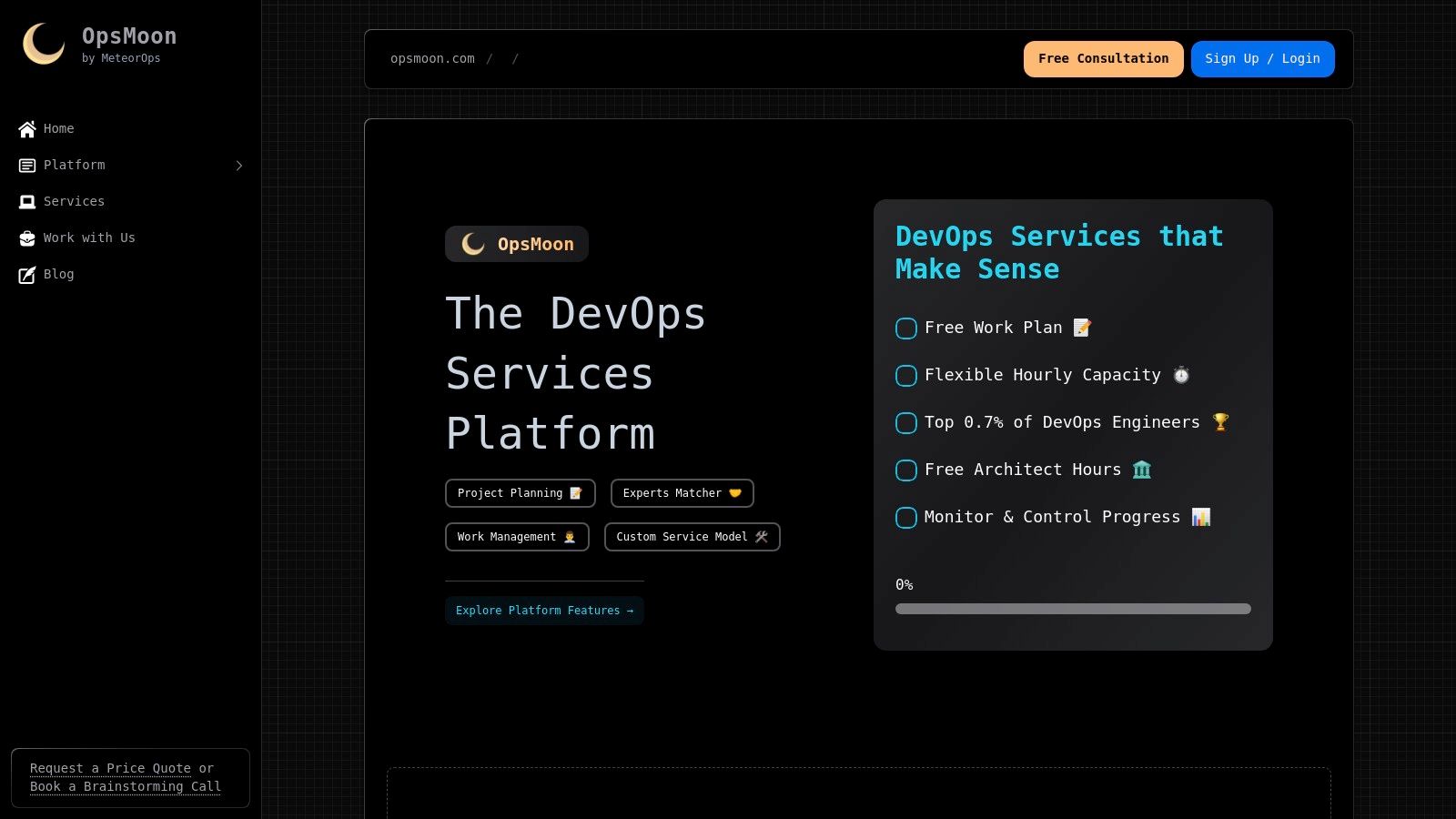
The platform’s core strength lies in its meticulous, structured delivery process that begins before any contract is signed. OpsMoon offers a complimentary, in-depth work planning session where their architects assess your current cloud infrastructure, define migration objectives, and deliver a detailed roadmap. This initial step de-risks the engagement by providing a clear scope and a tangible plan, ensuring alignment from day one.
Key Strengths and Technical Capabilities
OpsMoon’s approach is fundamentally technical, focusing on the practical application of modern DevOps and SRE principles to cloud migration challenges.
- Elite Talent Sourcing: The platform's proprietary Experts Matcher technology is a significant differentiator. It sources engineers from the top 0.7% of the global DevOps talent pool, ensuring that the expert assigned to your migration project possesses deep, proven experience.
- Infrastructure as Code (IaC) Mastery: Their engineers are specialists in tools like Terraform and Pulumi, enabling them to codify your entire infrastructure. This ensures your new cloud environment is reproducible, version-controlled, and easily scalable from the start. A typical migration involves creating modular Terraform configurations for VPCs, subnets, security groups, and compute resources.
- Kubernetes and Containerization Expertise: For organizations migrating containerized applications, OpsMoon provides experts in Kubernetes, Docker, and Helm. They handle everything from designing GKE or EKS clusters to optimizing Helm charts for production workloads and implementing service meshes like Istio for advanced traffic management.
- CI/CD Pipeline Automation: Migration isn't just about moving infrastructure; it's about optimizing delivery. OpsMoon engineers design and implement robust CI/CD pipelines using tools like Jenkins, GitLab CI, or GitHub Actions to automate testing and deployment into the new cloud environment, minimizing downtime and human error.
How OpsMoon Delivers Value
The platform's value extends beyond just talent. It’s the combination of expertise with a managed, transparent process that sets it apart. The inclusion of free architect hours with engagements ensures strategic oversight, while real-time progress monitoring tools give stakeholders complete visibility. This structured approach, which you can explore further in their guide to cloud migration consulting services, ensures projects stay on track and on budget.
| Feature Highlight | Practical Application |
|---|---|
| Free Work Planning | A migration roadmap is created, defining phases like discovery, IaC development, pilot migration, and cutover. |
| Flexible Engagements | Choose from end-to-end project delivery, hourly staff augmentation, or ongoing SRE support post-migration. |
| Broad Tech Stack | Experts are available for AWS, GCP, Azure, and tools like Prometheus, Grafana, ArgoCD, and more. |
Pros and Cons
Pros:
- Elite Talent Matching: Access to the top 0.7% of global DevOps engineers ensures a high level of expertise.
- Structured Onboarding: The free work planning session and clear roadmap significantly reduce project kickoff friction.
- Flexible Engagement Models: Easily scale support up or down based on project needs.
- Transparency and Control: Real-time monitoring keeps you in command of the project's progress.
- Deep Technical Coverage: Extensive experience across the entire modern cloud-native ecosystem.
Cons:
- No Public Pricing: Budgeting requires a direct consultation to get a project estimate, as standard rates are not listed.
- Remote-Only Model: May not be suitable for organizations requiring on-site engineers or with strict vendor compliance for remote contractors.
Website: https://opsmoon.com
2. AWS Marketplace – Professional Services (Migration)
For organizations deeply embedded in the Amazon Web Services ecosystem, the AWS Marketplace for Professional Services offers a streamlined and integrated channel for procuring expert cloud migration assistance. Rather than searching externally, this platform acts as a centralized hub, allowing you to discover, contract, and pay for migration services from a curated list of vetted AWS partners. This model fundamentally simplifies procurement by consolidating third-party service charges directly onto your monthly AWS bill.
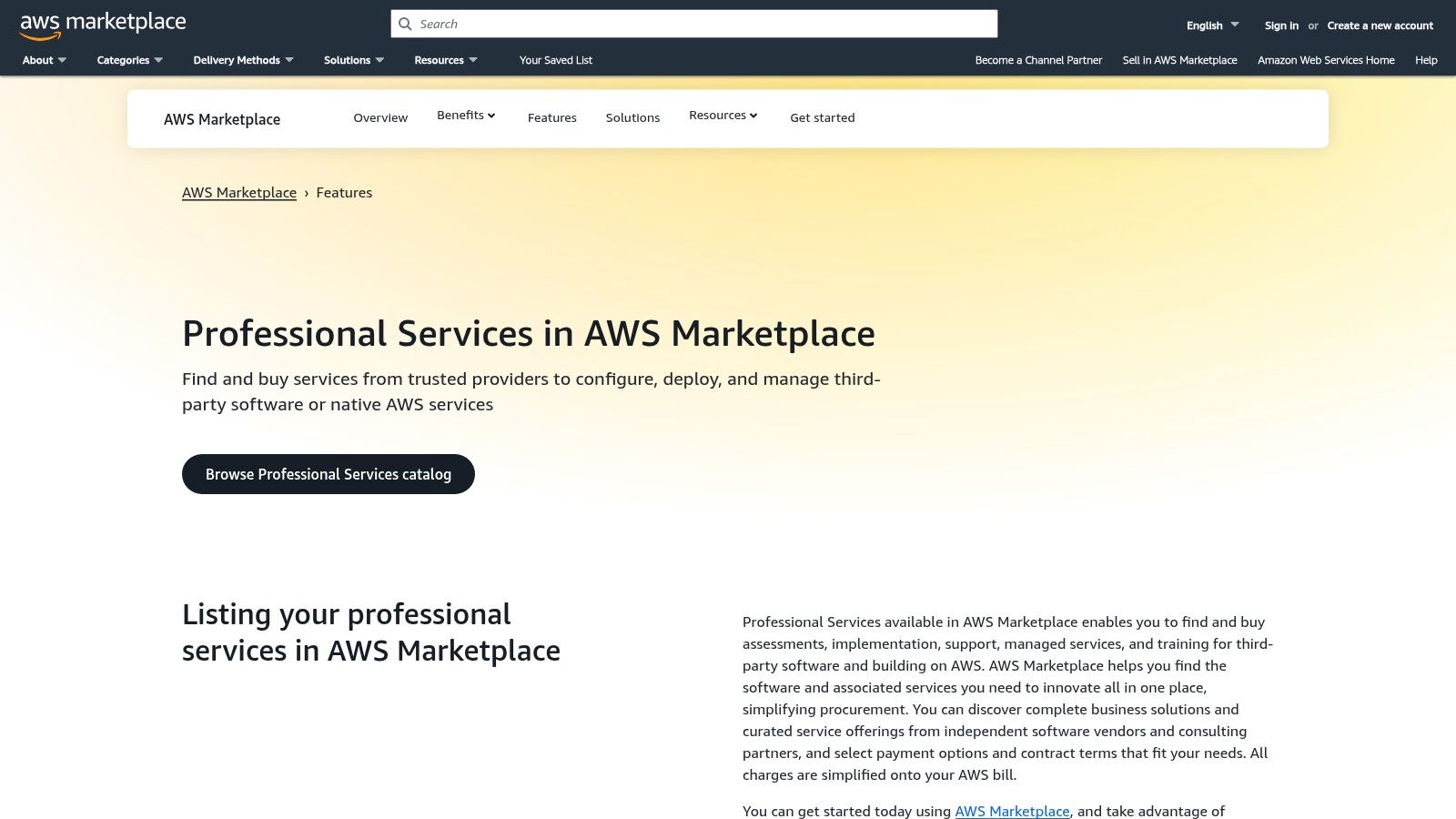
The primary advantage is the direct integration with AWS programs and billing. Many listings are aligned with the AWS Migration Acceleration Program (MAP), a comprehensive framework designed to reduce the cost and complexity of migrations. By engaging a MAP-qualified partner through the Marketplace, you can often unlock significant funding and credits from AWS to offset the professional services fees, making it a financially strategic choice.
Key Features and Workflow
The AWS Marketplace is not just a directory; it's a transactional platform designed to accelerate how you engage with cloud migration service providers. Its core functionality is built around simplifying the entire procurement lifecycle.
- Integrated Discovery and Filtering: You can use precise filters to find partners based on their specific competencies, such as "Migration" or "DevOps," pricing models (fixed fee vs. per unit), and specific service offerings like assessments or full-scale implementation projects.
- Private Offers: While some services have standard pricing, most complex migration projects are handled via Private Offers. This feature allows you to negotiate a custom scope of work, timeline, and price directly with a provider within the Marketplace's secure framework. The final agreement is then published privately for your account to accept.
- Consolidated AWS Billing: Once you accept an offer, all charges for the professional services appear as a line item on your existing AWS invoice. This simplifies vendor management and eliminates the need to onboard a new supplier through traditional procurement channels.
Technical Tip: When using the Marketplace, look for providers with the "AWS Migration Competency" designation. This is a rigorous technical validation from AWS that confirms the partner has demonstrated expertise and a track record of successful, large-scale migration projects.
How to Use AWS Marketplace Effectively
To maximize the platform's value, it's crucial to approach it strategically. Start by clearly defining your migration requirements, including the scope of workloads, desired timelines, and technical objectives. Use the Marketplace filters to create a shortlist of 3-5 potential partners who hold relevant competencies.
Engage these shortlisted partners to request Private Offers. Provide each with the same detailed requirements to ensure you receive comparable proposals. This process also allows you to assess their responsiveness and technical depth. For organizations looking to modernize their infrastructure post-migration, it is beneficial to explore partners who also specialize in modern operational practices. You can learn more about how top AWS DevOps consulting partners leverage the marketplace to deliver comprehensive solutions.
| Feature | Benefit for Technical Leaders |
|---|---|
| MAP Integration | Directly access AWS-provided funding to reduce migration project costs, maximizing your budget. |
| Private Offers | Negotiate detailed, custom Scopes of Work (SoWs) for complex technical projects. |
| AWS Bill Consolidation | Streamlines procurement and accounting, avoiding lengthy new-vendor onboarding processes. |
| Vetted Competency Partners | Ensures you are engaging with providers who have passed AWS's stringent technical validation. |
Website: AWS Marketplace – Professional Services
3. Microsoft Commercial Marketplace – Migration Professional Services
For organizations operating within the Microsoft Azure ecosystem, the Commercial Marketplace offers a direct and trusted pathway to engage with expert cloud migration service providers. This platform serves as a centralized catalog where businesses can discover, evaluate, and procure professional services from Microsoft-certified partners. Its primary function is to simplify the sourcing and contracting process by integrating third-party services directly with your existing Microsoft billing and enterprise agreements.
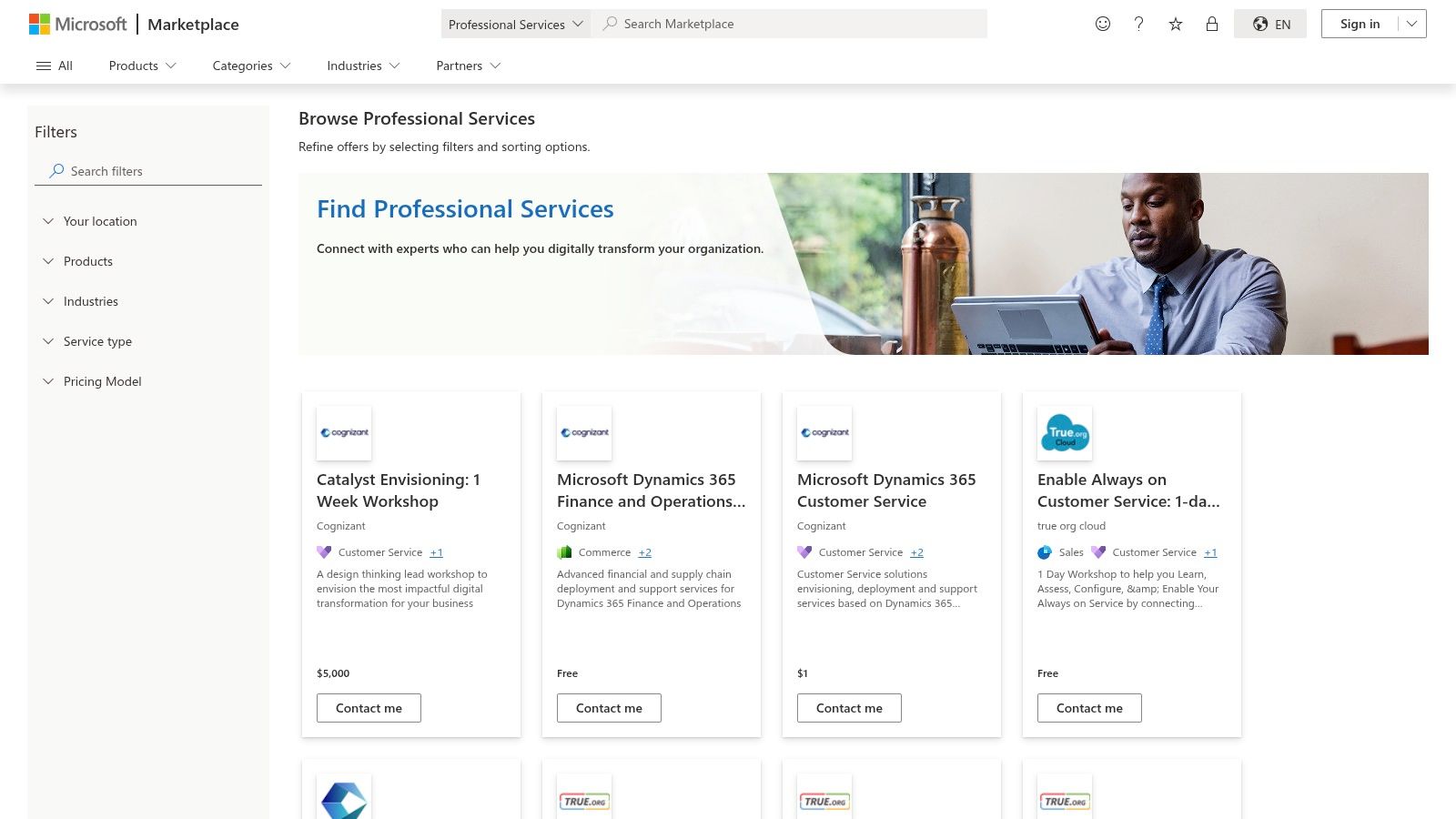
The key advantage of the Marketplace is the high level of trust and assurance provided by Microsoft's rigorous partner vetting programs. Partners listed often hold advanced specializations or the coveted Azure Expert MSP (Managed Service Provider) designation, which signifies deep technical expertise and a proven track record in delivering successful Azure projects. This built-in quality control significantly de-risks the partner selection process for complex migration initiatives.
Key Features and Workflow
The Microsoft Commercial Marketplace is more than a simple directory; it is a transactional platform designed to streamline the procurement of specialized cloud migration service providers. Its features are geared toward creating transparency and simplifying engagement.
- Dedicated "Migration" Category: The platform features a specific professional services category for migration, allowing you to easily browse pre-scoped offers. These can range from initial assessments and discovery workshops to full-scale workload migrations.
- Fixed-Price and Custom Offers: A notable feature is the presence of listings with upfront, fixed pricing for specific deliverables, such as a "3-day migration assessment." This improves budget predictability for initial project phases. For more complex needs, the "Contact me" workflow facilitates direct negotiation for a custom scope of work.
- Integrated Procurement and Billing: Engagements procured through the Marketplace can be tied to your existing Microsoft enterprise agreements. This streamlines vendor onboarding, consolidates invoicing, and simplifies financial management by centralizing service costs with your Azure consumption bill.
Technical Tip: When evaluating partners, prioritize those with the "Azure Expert MSP" status or an advanced specialization in "Windows Server and SQL Server Migration to Microsoft Azure." These credentials are a strong indicator of a provider's validated expertise and their ability to handle complex, enterprise-grade migrations.
How to Use Microsoft Commercial Marketplace Effectively
To get the most out of the platform, begin with a well-defined migration scope, including the applications, databases, and infrastructure you plan to move. Use the "Migration" category to identify partners whose offers align with your initial needs, such as a readiness assessment. Pay close attention to the partner's credentials and customer reviews directly on the platform.
For complex projects, use the listings as a starting point to create a shortlist of 3-4 potential partners. Initiate contact through the marketplace to discuss your specific requirements in detail. This allows you to evaluate their technical depth and responsiveness before committing to a larger engagement. Exploring how expert Azure consulting partners structure their services can also provide valuable insight into crafting a successful migration strategy.
| Feature | Benefit for Technical Leaders |
|---|---|
| Partner Specializations | Easily vet providers via Microsoft-validated credentials like Azure Expert MSP, ensuring technical competence. |
| Fixed-Price Listings | Gain budget predictability for initial project phases like assessments and workshops with transparent pricing. |
| Integrated Procurement | Simplifies vendor management by tying service costs to existing Microsoft agreements and billing cycles. |
| Azure-Centric Focus | Ensures deep expertise in migrating and modernizing workloads specifically for the Azure platform. |
Website: Microsoft Commercial Marketplace – Migration Professional Services
4. Google Cloud Marketplace – Partner‑Delivered Professional Services (Migration)
For businesses operating on or planning a move to Google Cloud Platform (GCP), the Google Cloud Marketplace offers a cohesive and efficient way to find and procure expert migration services. Much like its AWS counterpart, this platform acts as a unified hub where you can discover, negotiate, and pay for services from vetted Google Cloud partners. This model streamlines the procurement process by integrating partner service charges directly into your existing Google Cloud bill.
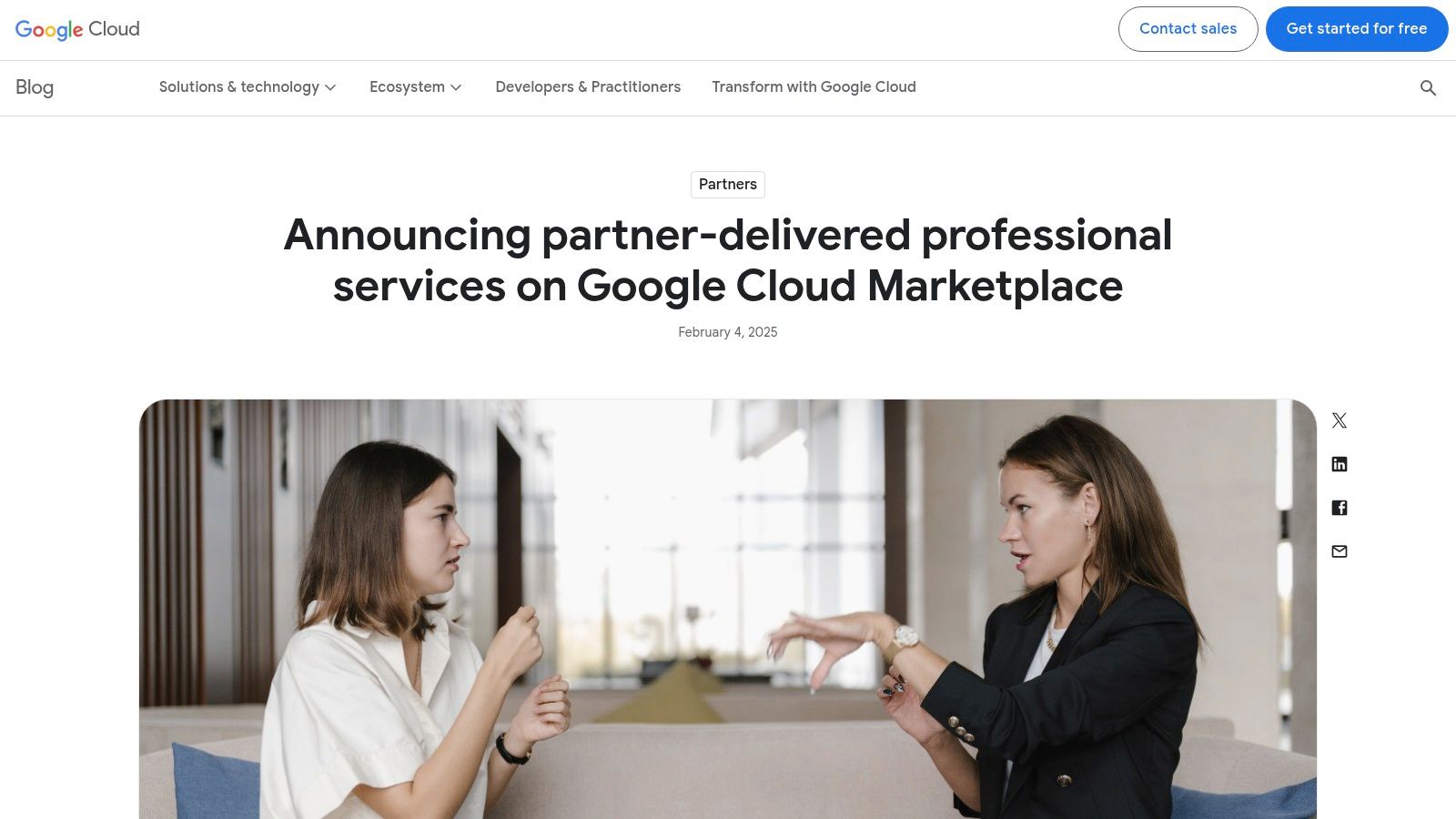
The key benefit is the seamless integration with the Google Cloud ecosystem, including its billing and migration tooling. Many partner offerings are designed to complement Google’s own Migration Center, which provides tools for assessment and planning. Engaging partners through the Marketplace allows organizations to leverage their Google Cloud spending commitments (if applicable) for third-party services, providing significant financial flexibility and simplifying budget management.
Key Features and Workflow
The Google Cloud Marketplace is more than a simple vendor directory; it is a transactional platform built to accelerate your engagement with qualified cloud migration service providers. Its core design principles center on simplifying the entire procurement journey from discovery to payment.
- Centralized Discovery and Services: The Marketplace lists professional services as distinct SKUs, covering everything from initial migration readiness assessments to full-scale implementation and post-migration managed services. This allows you to find specific, pre-defined service packages.
- Private Offers for Custom Scopes: Most significant migration projects require custom solutions. The Private Offers feature facilitates direct negotiation with a partner on a bespoke scope of work, timeline, and pricing. The final, mutually agreed-upon offer is then transacted securely within the Marketplace.
- Integrated Google Cloud Billing: After accepting a Private Offer, all fees for the professional services are consolidated onto your Google Cloud invoice. This eliminates the operational overhead of onboarding new vendors and processing separate payments, a crucial benefit for lean finance teams.
Technical Tip: When evaluating partners, prioritize those with the "Migration Specialization" designation. This is Google Cloud's official validation, confirming the partner has a proven methodology, certified experts, and a history of successful customer migrations.
How to Use Google Cloud Marketplace Effectively
To get the most out of the platform, begin with a thorough discovery phase using Google's free tools like the Migration Center to assess your current environment. This data will form the basis of your requirements document. Use the Marketplace to identify partners with the Migration Specialization who have experience with your specific workloads (e.g., SAP, Windows Server, databases).
Shortlist a few providers and engage them to develop Private Offers based on your detailed requirements. This competitive process not only ensures better pricing but also gives you insight into each partner's technical approach and responsiveness. Critically, inquire how they integrate their services with Google's native migration tools to ensure a smooth, tool-assisted execution. Note that while availability is expanding, some professional services transactions may have regional eligibility constraints, so confirm this early in your discussions.
| Feature | Benefit for Technical Leaders |
|---|---|
| Google Cloud Bill Integration | Allows using existing Google Cloud spending commitments to pay for migration services, optimizing cloud spend. |
| Private Offers | Enables negotiation of complex, custom SoWs for technical migrations directly within the platform. |
| Migration Center Synergy | Partners often align their services with Google's native tools, ensuring a data-driven and cohesive migration plan. |
| Vetted Partner Specializations | Guarantees engagement with providers who have met Google's rigorous technical and business standards for migration. |
Website: Google Cloud Marketplace – Professional Services
5. Accenture Cloud First – Cloud Migration Services
For large enterprises and public sector organizations embarking on complex, multi-faceted cloud journeys, Accenture Cloud First offers a strategic, end-to-end partnership. This global systems integrator specializes in large-scale, intricate migrations across AWS, Azure, and Google Cloud, moving beyond simple "lift-and-shift" projects to drive comprehensive business transformation. Their approach is built for organizations where cloud migration is intertwined with modernizing applications, data platforms, and security protocols simultaneously.
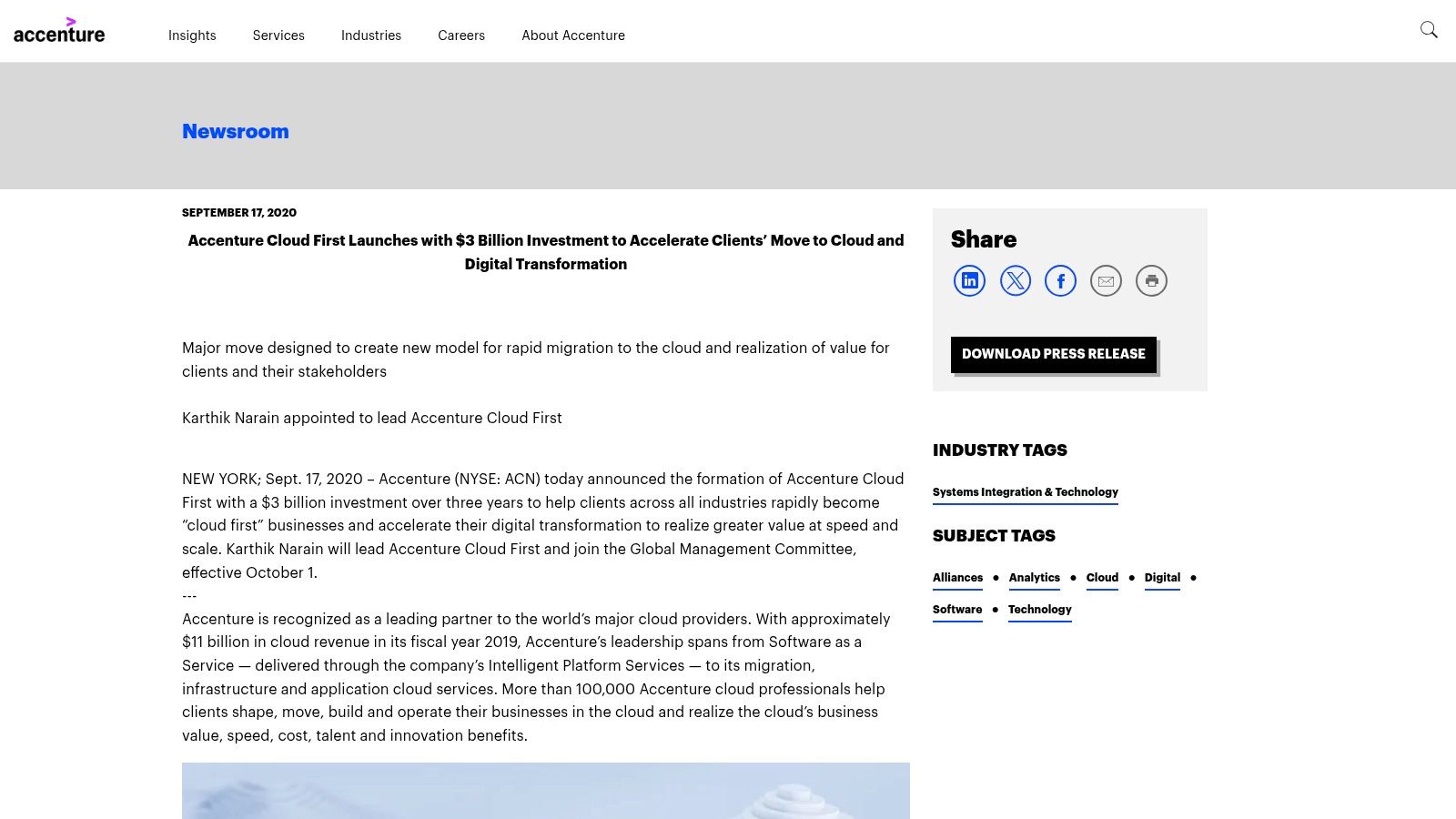
The key differentiator for Accenture is its "factory" model for migration, which uses a combination of proprietary accelerators, automation, and standardized processes to execute migrations at a massive scale and predictable velocity. This methodology is particularly effective for enterprises with hundreds or thousands of applications and servers to migrate. Deep, strategic partnerships with all major hyperscalers mean Accenture can architect solutions that are not just technically sound but also optimized for commercial incentives and long-term platform roadmaps.
Key Features and Workflow
Accenture's engagement model is consultative and tailored, designed to manage the immense complexity inherent in enterprise-level digital transformations. Their process is less about a self-service platform and more about a structured, high-touch partnership with cloud migration service providers.
- Cloud Migration "Factories": These are dedicated, repeatable frameworks that combine automated tools, skilled teams, and proven methodologies to migrate workloads efficiently and with reduced risk. This industrial-scale approach minimizes bespoke engineering for common migration patterns.
- Regulated Environment Expertise: Accenture operates specialized offerings for heavily regulated sectors, including a dedicated Azure Government migration factory. This ensures compliance with stringent data sovereignty and security requirements like FedRAMP or CJIS.
- Integrated Modernization: Migrations are often coupled with application modernization (e.g., containerization or moving to serverless), data estate modernization (e.g., migrating to cloud-native data warehouses), and security transformation, providing a holistic outcome.
- Deep Hyperscaler Alliances: As a top-tier partner with AWS, Microsoft, and Google, Accenture has access to co-investment funds, dedicated engineering resources, and early-access programs that can de-risk projects and lower costs for their clients.
Technical Tip: When engaging a global systems integrator like Accenture, be prepared to discuss business outcomes, not just technical tasks. Frame your requirements around goals like "reduce data center TCO by 40%" or "increase application deployment frequency by 5x" to leverage their full strategic capability.
How to Use Accenture Effectively
To maximize value from an Accenture engagement, an organization must have strong executive sponsorship and a clear vision for its cloud transformation. The initial phases will involve extensive discovery and strategy workshops to build a comprehensive business case and a detailed, phased migration roadmap. Pricing is entirely bespoke and determined after this in-depth analysis.
Technical leaders should prepare detailed documentation of their current application and infrastructure portfolio, including dependencies, performance metrics, and compliance constraints. The more data you provide upfront, the more accurate and efficient the planning process will be. For CTOs at large enterprises, the primary benefit is gaining a partner that can manage not only the technical execution but also the organizational change management required for a successful cloud adoption.
| Feature | Benefit for Technical Leaders |
|---|---|
| Migration "Factories" | Provides a predictable, repeatable, and scalable mechanism for migrating large application portfolios. |
| Holistic Modernization | Integrates application, data, and security modernization into the migration for a transformative outcome. |
| Regulated Industry Focus | Ensures migrations meet strict compliance and security controls for government and financial services. |
| Enterprise-Scale Delivery | Proven ability to manage complex, multi-year programs with thousands of interdependent workloads. |
Website: Accenture Cloud First Launches with $3 Billion Investment
6. Rackspace Technology – Cloud Migration Services
Rackspace Technology distinguishes itself by offering highly structured, fixed-scope migration packages designed to accelerate the transition to the cloud while embedding operational best practices from day one. This approach is ideal for organizations seeking predictable outcomes and a clear path from migration to long-term management. Rather than offering purely consultative services, Rackspace bundles migration execution with ongoing Day-2 operations, providing a holistic service that addresses the entire cloud lifecycle.
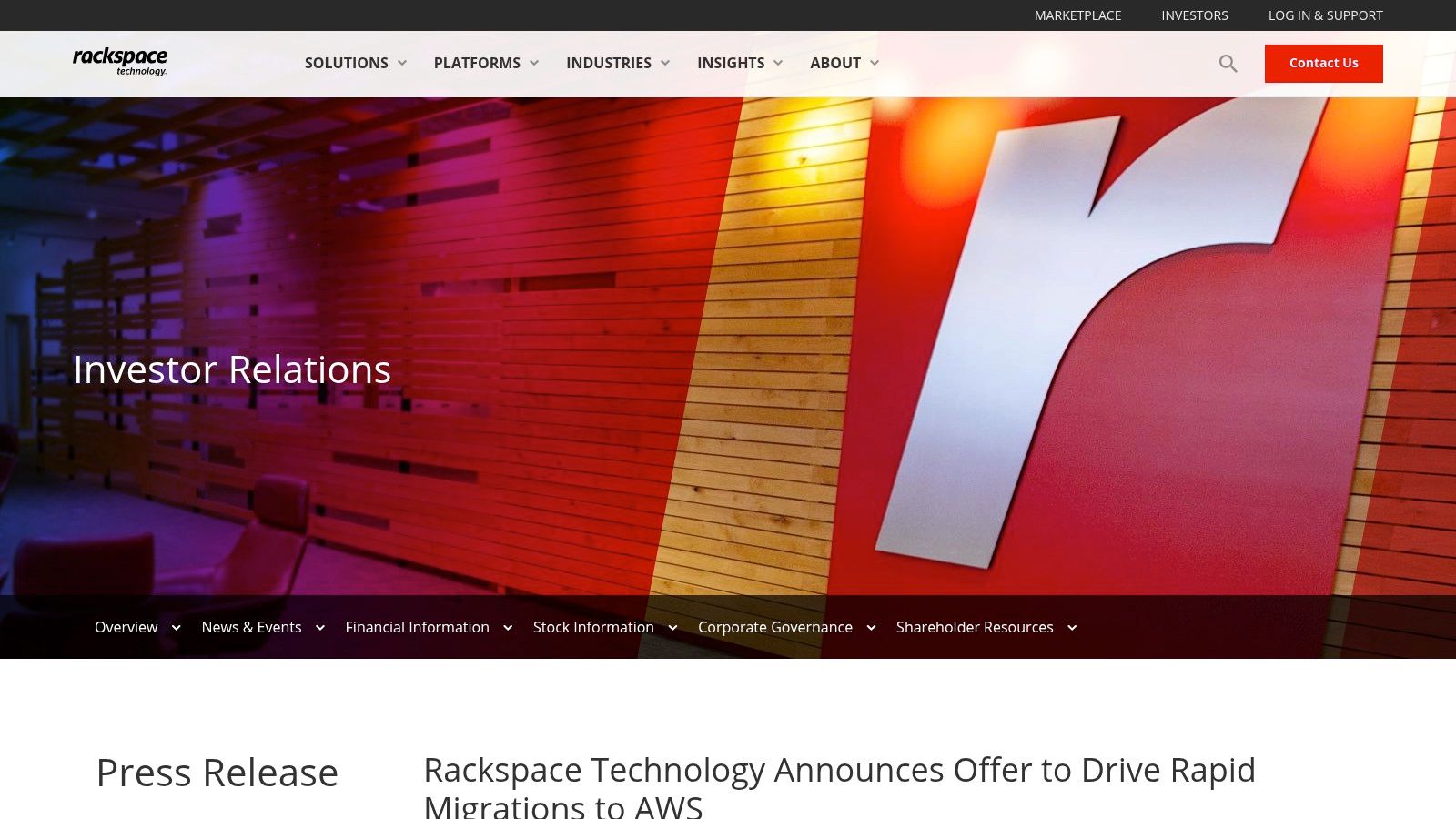
The core of their offering is a prescriptive methodology that simplifies planning and reduces time-to-value. A prime example is the Rackspace Rapid Migration Offer (RRMO) for AWS, which provides a packaged solution with transparent per-VM pricing. This model is particularly appealing for technical leaders who need to forecast costs accurately and demonstrate a swift return on investment. By including a trial of their 24x7x365 operations, they give businesses a direct experience of their managed services capabilities post-migration.
Key Features and Workflow
Rackspace’s model is built around pre-defined packages that streamline the entire migration process, making them a key player among cloud migration service providers for businesses that value speed and predictability. Their workflow is designed to minimize ambiguity and ensure a smooth handover to their operations team.
- Prescriptive Migration Packages: The RRMO for AWS includes essential services bundled into one offering: discovery and planning, landing zone setup, migration execution, and a two-month trial of their managed operations. This removes much of the complexity associated with custom-scoped projects.
- Transparent Pricing Models: For its flagship offers like the RRMO, Rackspace uses a fixed per-VM pricing structure. This simplifies budgeting and procurement, allowing teams to calculate migration costs upfront based on the number of virtual machines in scope.
- Integrated Day-2 Operations: A key differentiator is the built-in transition to managed services. The included two-month operations trial provides ongoing support for the migrated environment, covering monitoring, incident management, and patching, ensuring stability right after the cutover.
- Multi-Cloud Collaborations: Beyond AWS, Rackspace has established collaborations and specific offers for Google Cloud migrations and application modernization projects, providing a pathway for organizations invested in a multi-cloud strategy.
Technical Tip: When evaluating the RRMO, scrutinize the "per-VM" definition to ensure it aligns with your workload complexity. Ask for clarity on how database servers, application servers with complex dependencies, and oversized VMs are treated within the fixed-price model to avoid scope creep.
How to Use Rackspace Technology Effectively
To get the most value from Rackspace, start by assessing if your migration project fits one of their prescriptive offers. The RRMO is best suited for "lift-and-shift" or "re-host" scenarios where the primary goal is to move existing VMs to the cloud quickly and efficiently. Clearly document your server inventory and dependencies before engaging them to get an accurate quote based on their per-VM model.
During the engagement, take full advantage of the two-month operations trial. Use this period to evaluate their response times, technical expertise, and reporting capabilities. This is a risk-free opportunity to determine if their managed services model is a good long-term fit for your organization's operational needs post-migration.
| Feature | Benefit for Technical Leaders |
|---|---|
| Rapid Migration Offer (RRMO) | Accelerates migration timelines with a pre-packaged, end-to-end solution. |
| Fixed Per-VM Pricing | Provides cost predictability and simplifies budget approval for lift-and-shift projects. |
| Integrated Day-2 Operations Trial | Offers a seamless transition to managed operations, ensuring post-migration stability and support. |
| Potential AWS/ISV Funding | Leverages Rackspace's partner status to potentially access funding and credits that reduce overall project cost. |
Website: Rackspace Technology – Cloud Migration Services
7. IBM Consulting – Cloud Migration Consulting
For large enterprises facing complex, multi-faceted modernization challenges, IBM Consulting offers a structured and highly governed approach to cloud migration. It specializes in large-scale transformations, particularly for organizations with significant investments in hybrid cloud architectures, mainframes, or operations in heavily regulated industries. Their methodology is designed to handle intricate dependencies across vast application portfolios, making them a go-to partner for complex, high-stakes projects.
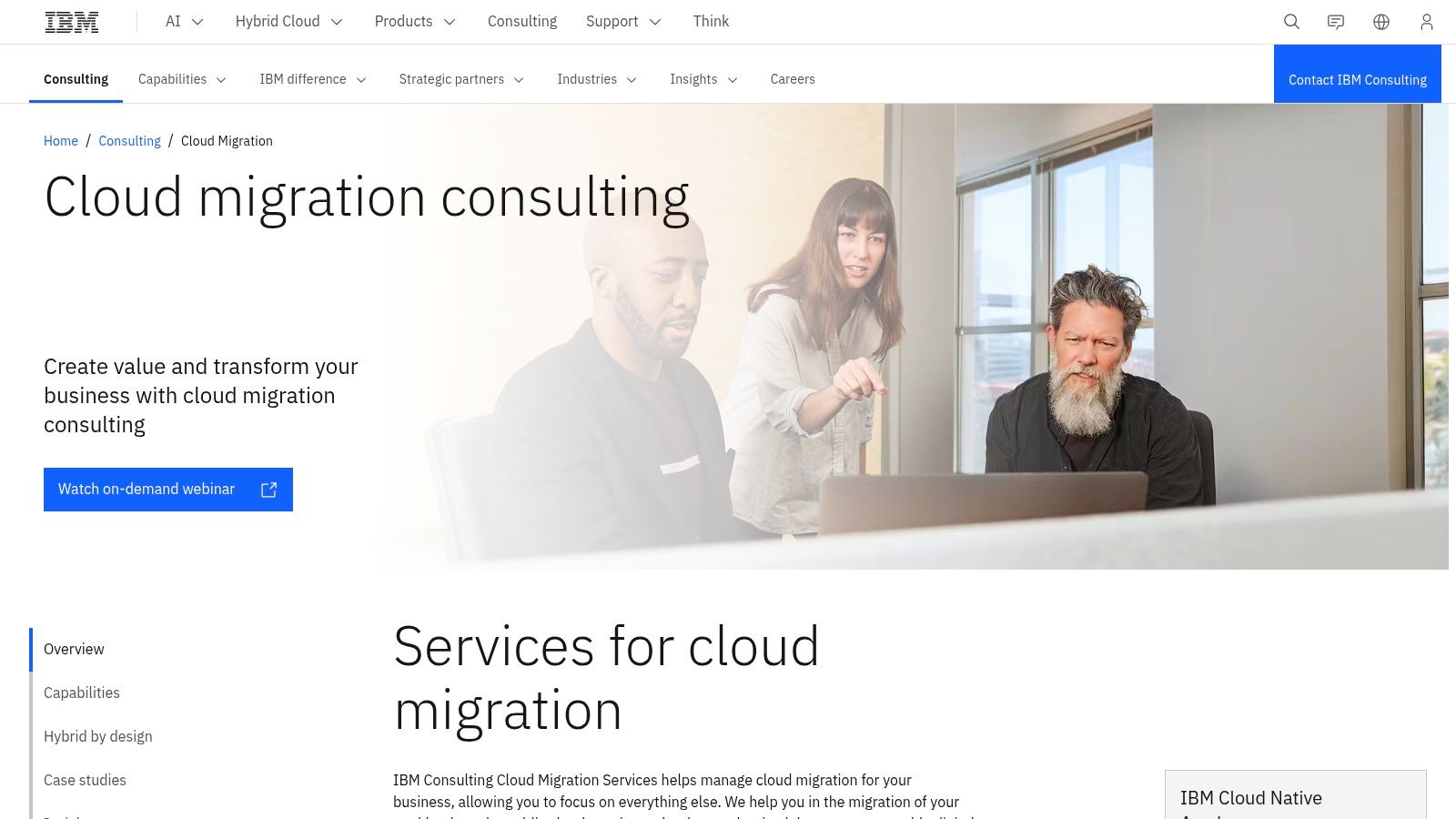
The core differentiator for IBM is its deep expertise in hybrid and multi-cloud scenarios, often leveraging Red Hat OpenShift to create a consistent application platform across on-premises data centers and public clouds like AWS, Azure, and Google Cloud. This focus addresses the reality that many large organizations will not move 100% to a single public cloud but will instead operate a blended environment. This makes IBM one of the most experienced cloud migration service providers for this specific use case.
Key Features and Workflow
IBM's approach is built around a proprietary platform and a comprehensive services framework designed to inject predictability and automation into complex migrations. This system orchestrates the entire lifecycle, from initial assessment to post-migration optimization.
- IBM Consulting Advantage for Cloud Transformation: This is an AI-enabled delivery platform used to accelerate planning and execution. It helps automate the discovery of application dependencies, recommends migration patterns (e.g., rehost, replatform, refactor), and orchestrates the toolchains required for execution, reducing manual effort and potential for error.
- Comprehensive Portfolio Migration: Services extend beyond standard application and data migration. IBM offers specialized expertise for legacy systems, including mainframe modernization, IBM Power systems, and large-scale SAP workload migrations to the cloud.
- Strong Hybrid/Multi-Cloud Focus: Rather than favoring a single cloud provider, IBM’s strategy is built on creating cohesive operating models across different environments. This is ideal for organizations looking to avoid vendor lock-in or leverage specific capabilities from multiple clouds.
Technical Tip: When engaging with IBM, focus discovery conversations on their "Garage Method." This is their collaborative framework for co-creation and agile development. Pushing for this approach ensures your technical teams are deeply involved in the design and execution phases, rather than being handed a black-box solution.
How to Use IBM Consulting Effectively
To maximize value from an engagement with IBM, your organization should have a clear strategic mandate for a large-scale transformation, not just a tactical lift-and-shift project. Begin by documenting your key business drivers, regulatory constraints, and the strategic importance of your hybrid cloud architecture.
When you engage with their consultants, come prepared with an inventory of your most complex workloads, such as those with deep mainframe integrations or strict data sovereignty requirements. This allows IBM to quickly demonstrate the value of their specialized tooling and methodologies. Unlike marketplace providers, the engagement process is consultative and longer, so use the initial workshops to co-create a detailed migration roadmap that aligns their technical capabilities with your long-term business goals.
| Feature | Benefit for Technical Leaders |
|---|---|
| Consulting Advantage Platform | Leverages AI and automation to de-risk planning and execution for large, interdependent application portfolios. |
| Hybrid and Multi-Cloud Expertise | Provides a strategic approach for building and managing applications consistently across on-prem and multiple public clouds. |
| Legacy System Modernization | Offers specialized and proven methodologies for migrating complex systems like mainframes, SAP, and IBM Power. |
| Regulated Industry Experience | Deep expertise in navigating compliance and security requirements for financial services, healthcare, and government. |
Website: IBM Consulting – Cloud Migration
7-Provider Cloud Migration Services Comparison
| Service | Implementation complexity | Resource requirements | Expected outcomes | Ideal use cases | Key advantages |
|---|---|---|---|---|---|
| OpsMoon | Low–Medium — structured, fast kickoff and remote delivery | Senior remote DevOps engineers, minimal procurement, free planning/architect hours | Faster releases, improved reliability, stabilized cloud ops | Startups, SMBs, targeted DevOps/SRE or platform projects | Elite talent matching, flexible engagement models, transparent progress monitoring |
| AWS Marketplace – Professional Services (Migration) | Variable — depends on partner scope; often Private Offers | AWS account/billing, partner engagement, possible MAP funding | Procured migration assessments/implementations billed via AWS | AWS customers seeking vetted partners and consolidated billing | Consolidated procurement/invoicing, standardized Marketplace terms, MAP access |
| Microsoft Commercial Marketplace – Migration Professional Services | Variable — many listings use contact workflow rather than instant checkout | Microsoft billing/agreements; Azure‑centric partner relationships | Azure‑focused migration engagements; some fixed‑price assessments available | Azure customers needing certified partners and predictable scopes | Partner vetting via specializations, some public/fixed pricing for predictability |
| Google Cloud Marketplace – Partner‑Delivered Professional Services (Migration) | Variable — often Private Offers; integrates with Google tooling | Google Cloud billing, partner quotes, integration with Migration Center | Migration projects aligned to Google tooling and billing commitments | Google Cloud customers using Migration Center and partner services | Centralized procurement on Google billing, strong documentation and assessment programs |
| Accenture Cloud First – Cloud Migration Services | High — enterprise, factory‑style scaled migrations | Large program budgets, long procurement cycles, multi‑hyperscaler resources | Large‑scale, end‑to‑end migrations and modernization at enterprise scale | Enterprises and public‑sector organizations with complex portfolios | Proven delivery at scale, deep hyperscaler partnerships, regulatory capability |
| Rackspace Technology – Cloud Migration Services | Medium–High — prescriptive packages with execution and ops | Fixed per‑VM or custom pricing for offers, operations trial resources | Rapid, prescriptive migrations with built‑in Day‑2 operations | Teams wanting clear packages and ongoing operations support, AWS‑aligned projects | Clear, prescriptive offers, Day‑2 operations included, strong AWS alignment |
| IBM Consulting – Cloud Migration Consulting | High — complex hybrid/multi‑cloud and regulated migrations | Enterprise budgets, automation tooling (Consulting Advantage), hybrid expertise | Orchestrated, de‑risked migrations across hybrid and regulated environments | Large portfolios, hybrid infrastructures, mainframe/SAP and regulated workloads | Hybrid focus, automation tooling, Red Hat and multicloud partnerships |
Making the Final Cut: A Technical Checklist for Choosing Your Partner
Choosing the right partner from the diverse landscape of cloud migration service providers is a critical engineering decision, not just a procurement exercise. The choice you make today will define your operational agility, security posture, and ability to innovate for years to come. As we've explored, the options range from the hyperscaler marketplaces of AWS, Microsoft, and Google, offering a directory of vetted professionals, to global systems integrators like Accenture and IBM, who provide enterprise-scale, structured programs. Meanwhile, specialists like Rackspace Technology offer deep managed services expertise, and modern platforms like OpsMoon provide access to elite, on-demand DevOps and SRE talent for highly technical, automated migrations.
Moving from this broad understanding to a final decision requires a rigorous, technical-first evaluation. Your goal is to find a partner whose engineering philosophy and technical capabilities align with your long-term vision for cloud operations.
The Technical Vetting Gauntlet: Your Pre-Flight Checklist
Before you sign any contract, put potential providers through a technical gauntlet. Go beyond their marketing materials and demand concrete evidence of their capabilities. This checklist will help you separate the true technical partners from the sales-driven vendors.
-
Demand a Toolchain Deep Dive:
- Assessment & Discovery: Which tools do they use to map application dependencies and server estates? Do they rely on agent-based tools like CloudEndure or agentless options like Azure Migrate? A mature partner will justify their choice based on your specific environment's complexity and security constraints.
- Migration Execution: What is their primary engine for data and VM replication? Are they using native services (e.g., AWS DMS, Azure Database Migration Service) or third-party solutions? Ask for success metrics and potential "gotchas" with their preferred tools.
-
Scrutinize Their Infrastructure as Code (IaC) Maturity:
- Code Quality and Modularity: Don't just accept a "yes" when you ask if they use Terraform or CloudFormation. Request to see sanitized examples of their modules. Look for clean, modular, and well-documented code that follows best practices. This is a direct reflection of their engineering discipline.
- State Management and CI/CD Integration: How do they manage Terraform state files securely and collaboratively? Do they integrate IaC deployments into a proper CI/CD pipeline (e.g., using GitHub Actions, GitLab CI, or Jenkins)? A manual
terraform applyprocess is a significant red flag.
-
Pressure-Test Their Security and Governance Framework:
- Landing Zone Architecture: Ask for a detailed walkthrough of their standard landing zone architecture. How do they structure organizational units or accounts, VPC/VNet networking, and IAM policies? It should be built on a foundation of least-privilege access from day one.
- Compliance Automation: For regulated industries, how do they translate compliance requirements (like HIPAA or PCI-DSS) into automated guardrails and policies? Ask about their experience using tools like AWS Config, Azure Policy, or third-party Cloud Security Posture Management (CSPM) platforms.
-
Define "Done": The Day 2 Handoff and Beyond:
- Observability Stack: A migration is not complete until you have full visibility into the new environment. What is their standard approach to logging, monitoring, and alerting? Do they deploy and configure tools like Prometheus/Grafana, Datadog, or native cloud services like CloudWatch and Azure Monitor as part of the project?
- Knowledge Transfer and Empowerment: The ultimate goal is to enable your team. The handoff should include comprehensive architectural diagrams, runbooks for common operational tasks, and hands-on training sessions. A great partner makes themselves redundant by empowering your engineers.
Ultimately, the best cloud migration service providers act as a temporary extension of your own engineering team. They bring specialized expertise to accelerate your journey and, most importantly, leave you with a secure, automated, and maintainable cloud foundation. Whether you require the immense scale of an enterprise partner or the specialized, code-first approach of on-demand experts, this technical vetting process will ensure your migration is a launchpad for future success, not a source of future technical debt.
Ready to partner with the top 1% of freelance DevOps, SRE, and Platform Engineers for your cloud migration? OpsMoon connects you with elite, pre-vetted experts who specialize in building automated, secure, and scalable cloud foundations using Infrastructure as Code. Find the precise technical talent you need to execute a flawless migration by visiting OpsMoon today.

Leave a Reply